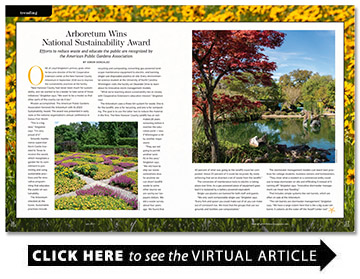Arboretum Wins National Sustainability Award
Efforts to reduce waste and educate the public are recognized by the American Public Gardens Association
BY Simon Gonzalez

One of Lloyd Singleton’s primary goals when he became director of the NC Cooperative Extension center at the New Hanover County Arboretum in September 2018 was to improve the sustainability practices at the facility.
“New Hanover County had never been much for sustainability, and we wanted to be a leader to take some of those initiatives,” Singleton says. “We want to be a model so that other parts of the county can do it too.”
Mission accomplished. The American Public Gardens Association honored the Arboretum with its 2023 Sustainability Award. The award was presented in early June at the national organization’s annual conference in Dallas-Fort Worth.
“This is a big deal,” Singleton says. “I’m very proud of it.”
Grounds maintenance supervisor Kevin Castle traveled to Texas to receive the award, which recognizes a garden for its commitment to promoting and using sustainable practices and for innovative programming that educates the public on sustainability.
The Arboretum checked all the boxes. Sustainable practices include recycling and composting, converting gas-powered landscape maintenance equipment to electric, and banning single-use disposable plastics on site. Every environmental science student at the University of North Carolina Wilmington visits the facility on Oleander Drive to learn about its innovative storm management models.
“What we’re teaching about sustainability ties in closely with Cooperative Extension’s education mission,” Singleton says.
The Arboretum uses a three-bin system for waste. One is for the landfill, one is for recycling, and one is for composting. The goal is to use the latter two to reduce the material in the first. The New Hanover County landfill has an estimated 28 years remaining before it reaches the saturation point — less if Wilmington is hit by another major storm.
“They are not going to permit another landfill in this area,” Singleton says. “We will have to ship our waste somewhere else. So anytime we can divert landfill waste to some other source we are saving our taxpayers dollars. We did a waste survey about four years ago. We found that 40 percent of what was going to the landfill could be composted. About 20 percent of it could be recycled. By really enforcing that we’ve diverted a lot of waste from the landfill.”

The conversion of maintenance tools to electric is taking place over time. As a gas-powered piece of equipment goes bad it is replaced by a battery-powered equivalent.
Single-use plastics are banned for both staff and guests.
“We only want compostable single use,” Singleton says. “Every fork and spoon you could make out of oil you can make out of cornstarch too. We insist that the groups that use our grounds and facilities use compostables.”
The stormwater management models can teach best practices for college students, business owners and homeowners.
“They show what a resident or a commercial entity could use to keep stormwater on site and infiltrating it instead of it running off,” Singleton says. “Innovative stormwater management can mean less flooding.”
That includes simple systems like rain barrels, which are often on sale at the Arboretum.
“The rain barrels are stormwater management,” Singleton says. “We have a large cistern here that is like a big scale rain barrel. It collects all the water off the Hutaff Center roof.”
